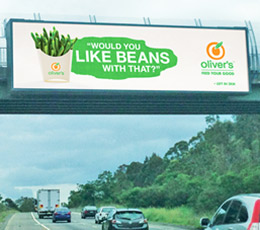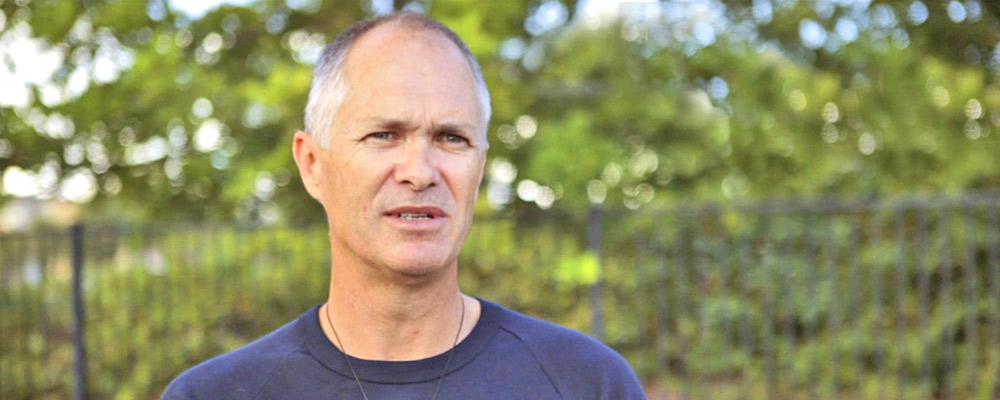Jason Gunn is the founder of Oliver’s Real Food, an Australian chain of healthy fast food restaurants.
Rolf Erickson: Why did you decide to start a restaurant chain?
Jason Gunn: I started Oliver’s Real Food in 2005 because I was frustrated at not being able to get the sort of food I wanted to eat. I also was quite passionate about health and nutrition, and about making a difference in the world. I wanted to create a business that could have a positive impact.
I didn’t think it could be that hard to start a business that was like McDonald’s or Burger King or KFC, but sold fresh, natural, organic food. It turned out that it was a much bigger job than I ever imagined. Within 18 months of starting the business, I’d lost a lot of money. The fact that I had no experience in food retailing and hospitality was taking its toll.
I felt that maybe everybody who’d been telling me that I couldn’t do it, and that the world that didn’t think like I did, were right. Maybe I’d made a big mistake.
Rolf: But you’d already started and sold a very profitable business.
 Jason: Yes. In 1989 I moved from New Zealand to Australia to start a business called Infolink. We developed an information system for the building industry. It was very successful in Australia, and then we franchised it in Canada and New Zealand. It was number one in every market that we went into.
Jason: Yes. In 1989 I moved from New Zealand to Australia to start a business called Infolink. We developed an information system for the building industry. It was very successful in Australia, and then we franchised it in Canada and New Zealand. It was number one in every market that we went into.
So from an outsider’s point of view, it was successful because it made a lot of money. But I always felt that there was something missing in my life. I just wasn’t happy. I think it was the sense that my life was ticking by, and I wasn’t doing something that really satisfied me. I wasn’t truly expressing who I was.
So when the opportunity came to sell Infolink in 1997 to a big world player in the publishing area, I jumped at it. People who knew me said, “You’ve worked so hard to create this business and get it to a point where it’s making lots of money. Why would you sell now?”
I told them, “It doesn’t satisfy me. It’s good at making money, but what else does it do? What contribution does it make?”
I thought long and hard about starting another business. What would I do and how would I do it? I took a look at the impact that some of these big fast food companies have had globally. It’s a massive impact considering the number of people that they touch. So I felt that this was an area where somebody needed to come in and change the way things were done.
“The first time I sat down and meditated with my teacher, I felt a sense of peace and happiness and contentment like I’d never experienced before in my life.” —Jason Gunn
Rolf: When did you learn the Transcendental Meditation® technique?
Jason: I learned TM on the 14th of April, 2011. The first time I sat down and meditated with my teacher, I felt a sense of peace and happiness and contentment like I’d never experienced before in my life. I drove home, parked right in front of my house, and sat in the car for an hour or more because I couldn’t think of anywhere that I needed to go or anything that I needed to do. I was totally at peace and happy. From the start I did my TM regularly, every morning and every afternoon.
Within just a matter of weeks, friends and family and the people that I worked with started noticing a shift in me. They were saying things like, “What’s happened to you? You’re so happy these days. Nothing seems to faze you. You seem like you’re in the zone.” And my staff was saying to me, “Everything you touch turns to gold.”
Two or three people on my management team said, “Hey, I’d love to learn. If that’s what you think is making so much difference in your life, tell me more.” I decided that as a company, we would support them by paying 50 percent of the cost of learning TM.
Three of them learned TM first, and the shift in those people, one of them in particular, was incredible. This guy had a reputation for being short-tempered, irritable. Sometimes you wouldn’t even talk to him because you could tell that he was in one of his moods. He was very talented, but he had this way about him.
Well, that melted away. The look on his face changed. He was like me—he felt a sense of peace and happiness. Now we’ve got 14 of our team that are meditators.
“The impact that we’re having and feedback we’re getting from our customers every day is so satisfying to the soul. I would do this even if we weren’t making money.” —Jason Gunn
Rolf: And now Oliver’s Real Food is starting to take off.
Jason: We’ve got four stores in Australia. We’re about to open another six. We’re focusing on major highway service areas. If you’re in Sydney or Brisbane or Melbourne you can go to sushi bars and salad bars, or juice bars. But if you drive between the major cities, it’s like a desert for decent food.
We want to position ourselves alongside the major fast food companies. We are the fresh, natural, organic alternative that makes healthy food available as conveniently and cost-effectively as all the other fast food outlets. But our real passion is to educate people about the benefits of good nutrition and about making a positive contribution.
To me, one of the most powerful ways that we can do that is to put more attention on our consciousness. If we can just be a little bit more conscious about what we’re doing, a little bit more conscious about how we’re doing it, and a little bit more conscious about the impact that we’re having on those around us, then the world could transform overnight.
The impact that we’re having and feedback we’re getting from our customers every day is so satisfying to the soul. I would do this even if we weren’t making money. That’s what encourages me to keep going every day and makes all of us in the business feel so good about what we’re doing.
“To me, TM is the most powerful gift that you could give for anybody who works within your business. At the end of the day, every business is the sum total of the people who work in that business.” —Jason Gunn
Rolf: You also made a video about bringing the TM technique into your business.
Jason: Initially I didn’t talk about meditation very much. I felt that it was a personal thing, even though I was experiencing a real shift within myself and a sense of peace and happiness I hadn’t experienced before. But as I’ve learned to talk about it more and share my experience more, I’ve found that there are people out there who want to hear my story.
In the last few months since I’ve started becoming more vocal about it, a lot of people I know have learned TM. The feedback that they’ve given me is that they’re experiencing similar shifts in themselves, and that’s a beautiful thing.
I was asked to speak about my practice of TM at a conference. That’s when I decided to make a video, so that the audience could not only hear my story, but the benefits that my employees are experiencing from their meditation as well.
Rolf: So you’d recommend the TM technique to other businesses?
Jason: To me, TM is the most powerful gift that you could give for anybody who works within your business. At the end of the day, every business is the sum total of the people who work in that business.
TM goes to the very heart of who you are as an individual and nurtures the self that sits within you. If we can all feel that deep sense of peace and happiness and contentedness within ourselves, and if you can get that collective experience within a company, then it’s got to change the whole vibration of the organization.
If we can nurture our team’s sense of self and get them in the zone, then that’s the most powerful thing we can do. From there, everything else takes care of itself.


Comments
You May Also Like
Creativity & the Arts
How a Top-Tier Design Studio Sustains Its Creative Edge | 3:40
The Lindsey Adelman Studio—featured in Oprah Magazine, Vogue, City Lights, and the New York Times—reveals how TM boosts work ethic, creativity, and productivity.
Business Success
HuffPost: Transcendental Meditation Is Going Corporate. Here’s Why That’s a Good Thing.
Boosting employee health and the bottom line are two of the main reasons the TM technique is so popular in corporate America today.
Business Success
Meditate to Sharpen Your Assertive Edge
Eschewing sleeping pills and other drugs, Charles Wallace, writing for Financial Times, favored a healthier approach to dealing with modern-day stress.